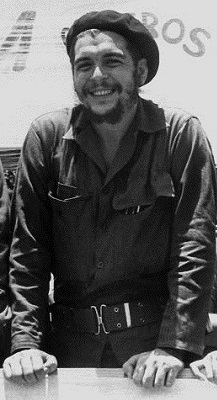|
~ Ernesto Che Guevara
~ Galéria
~ Oldal
~ Bejelentkezés
~ Vissza a Főoldalra
Ernesto Che Guevara, az argentin származású forradalmár, miniszter, gerillavezér és író, Buenos Aires-ben szerzett orvosi diplomát, majd a kubai forradalom során jelentős szerepet játszott a szigetország felszabadításában és újjáépítésében. A kubai gazdaság talpraállításáért dolgozott, küzdött az oktatás és az egészségügy fejlesztéséért, az írástudatlanság és a faji előítéletek felszámolásáért. Saját példájával népszerűsítette az önkéntes munkát. Kongóban és Bolíviában is harcolt - harminckilenc éves volt, amikor az amerikai-bolíviai csapatok csapdába ejtették és kivégezték.
| | |
|

| | |
|
|
|
Diarios de Motocicleta
|
Üdv!
Mára egy rövid modult készítettem a 'Diarios de Motocicleta' című filmről. Ez egyike annak a két alkotásnak, amit minden, Che Guevara iránt érdeklődő embernek látnia és ismernie kell. (A másik a Benicio Del Toro főszereplésével elkészült, két részből álló 'Che'.)
Írtam róla egy rövid ismertetőt, valamint csatoltam a trailerét és a gyönyörű záródalt, amellyel véget ér a film és amelyet önmagában is érdemes meghallgatni, függetlenül attól, hogy érdekel-e maga a napló vagy a film.
Itt megnézhetitek a modult: [Diarios de Motocicleta]
|
|
For today, I have made a module about the film 'Diarios de Motocicleta'. This is one of the two essential films that everyone who is interested in Che Guevara must know and watch. (The other film is the two-part 'Che' starring Benicio Del Toro.)
I have written a short summary about it, and I have attached the trailer and the beautiful closing music (soundtrack) that is worth listening to even if one is not interested in the diary or the film.
You can check it out here: [Diarios de Motocicleta]
|
|
|


| | |
|
|
|
~ Ernesto Che Guevara
~ Gallery
~ Site
~ Log in
~ Back to the Main page
Ernesto Che Guevara, the Argentine-born revolutionary, minister, guerrilla leader and writer, received his medical degree in Buenos Aires, then played an essential part in the Cuban Revolution in liberating and rebuilding the country. He did his best to set up the Cuban economy, fought for the improvement of the education and the health system, the elimination of illiteracy and racial prejudice. He promoted voluntary work by his own example. He fought in the Congo and in Bolivia - he was thirty-nine years old, when he was trapped and executed by the joint American-Bolivian forces.
| | |
|
|

